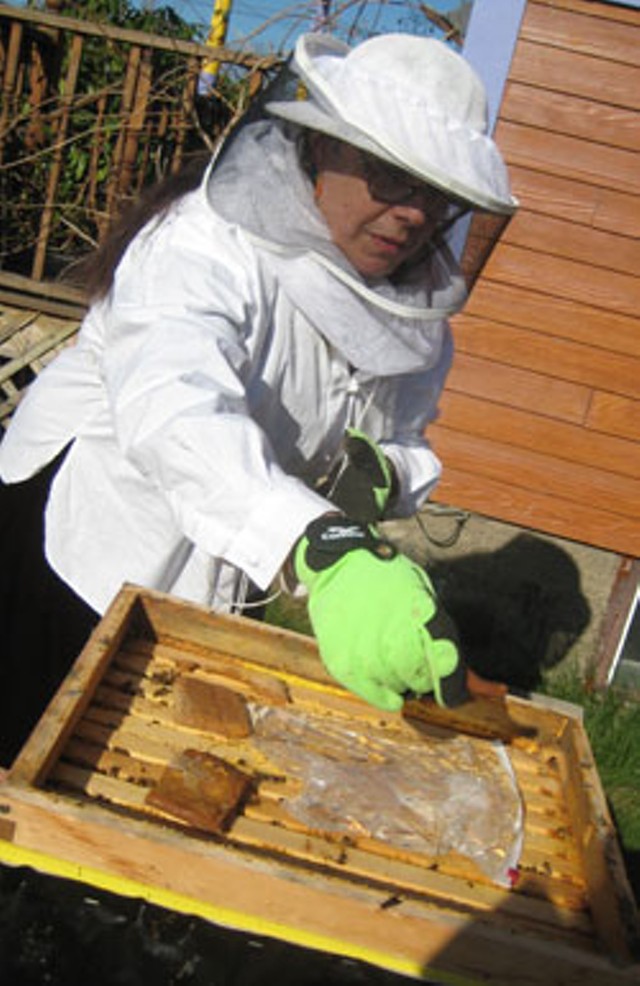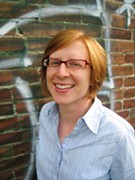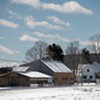Published April 21, 2010 at 4:20 a.m.
When Patty Ferreira comes home from work, she dons a mesh wire mask and some gloves, fires up the burlap smoker, and takes a peek at the bees living in the beehive perched in the northwest corner of her yard.
And just about every time she opens the hive, Ferreira gets stung. But she doesn’t mind. As with so many things in life, Ferreira knows if you want a little honey, you’re going to have to suffer a little for it.
Ferreira’s hobby apiary is a miniature operation in the most unlikely spot — a corner of her property at the junction of Berry Street and Lakeview Terrace in Burlington. When they leave her yard, the bees fly west across the street, headed to the tangle of vines, wildflowers and weeds that populate the hillside above Lake Champlain. They return to their hives laden with nectar with which to make honey and feed the colony.
If you didn’t know what to look for — a 2-foot-tall wooden box called a super that holds the moveable comb hives — you’d never know 45,000 bees shared Ferreira’s sliver of land.
Ferreira is one of a small group of backyard beekeepers who tend small colonies in Burlington. Bill Mares, president of the Vermont Beekeepers Association, estimates that roughly 20 people keep bees in the city. Steve Parise, an agricultural resource management specialist with the state Agency of Agriculture, guesses it’s more like a dozen.
Keeping bees in a city isn’t as odd as it seems. In Paris, the Rucher-école has been teaching the art of apiculture in the middle of the Luxembourg Gardens since 1856. One of its former students currently keeps bees atop the Paris Opera House.
In New York City, backyard and rooftop apiaries abound, though it was illegal to keep bees in the city until its health code was amended in March. In Los Angeles, a group called Backwards Beekeepers, which practices “all-organic, chemical-free” apiculture, runs a Bee Rescue Hotline for defenders of wayward honeybees.
Like many urban beekeepers, Ferreira says she was inspired to raise the honey-making insects by a desire to help counteract the effects of Colony Collapse Disorder — a phenomenon in which worker bees disappear from their hives — which became widespread in 2006. Mares recalls noticing a spike in interest in beekeeping around the state after the CCD scare was publicized.
As Ferreira began thinking about local food systems and environmentalism, keeping bees made sense to her, she says. Bees are essential for pollinating many food crops in our region. “I knew how important they were to what we eat,” says Ferreira, who is now in her third year of beekeeping.
Not only is hosting bees good for the planet, but it’s providing Ferreira with honey, and not the kind that comes from a mega-mart. Like most urban honey, her yield has a complex flavor, largely because of the variety of nectars the bees have to gorge on. Nectar from ornamental flowers tends to produce a much more “layered” varietal honey, Mares says.
Some may be skeptical about the notion that honey comes in a vast range of flavors — much like wine — depending on the flowers available to the bees. But the National Honey Board contends that honey from bees that visit primarily one type of bloom, such as buckwheat, blueberry or soybean, has a distinctive flavor and color.
While Ferreira’s bees may not visit one flower exclusively, she knows her honey is “definitely not Sue Bee,” she says, referring to the ubiquitous mass-market brand. “I’ve always been told honey is honey. But my honey, to me, tastes creamier and butterier,” Ferreira says. “It’s gorgeous.”
Mares, the 69-year-old de facto patriarch of urban beekeeping in Vermont, has kept hives at his South Willard Street home for the past decade, and he’s been involved with bees for nearly 40 years. In total, Mares keeps 14 hives around the city — two at home, five at the Intervale and seven at the University of Vermont.
Mares’ sloping backyard, now covered with a carpet of pink and blue phlox, is home to about 100,000 bees. They’re not exactly busy, but they are “reasonably productive,” Mares says. He gets about 60 to 70 pounds of honey a year from each hive.
Before he established his backyard hives, Mares, like Ferreira, talked with his neighbors about whether they’d mind insects taking up residence on his property. When he visited, Mares took along some of his honey. “Is it a bribe? Well, yeah. But it’s also a way to gauge the temperature,” he says.
Bee colonies in Vermont must be registered with the state, and 10,000 are currently on the rolls. Hobby apiculturists keep the “vast majority” of those hives, says the Agency of Agriculture’s Parise, who inspects about 2000 a year to make sure they are healthy.
When it comes to keeping bees, an urban environment doesn’t pose many more challenges than a rural one. Mares recommends beekeepers not keep more than three hives on their property when the surrounding area is densely populated. He also encourages urban apiarists to direct the opening of the hive inward, toward the property, so as to avoid any unintended dive-bombings.
But, Mares likes to emphasize, the bees aren’t looking to sting anyone. “They’re not coming out of the hive in a laser stream. They’re on a mission,” he says. Like Ferreira, Mares has lost track of how many times he’s been stung. He doesn’t mind, but he does caution that getting stung between the eyes “hurts a lot.”
In A Book of Bees: And How to Keep Them, author Sue Hubbell calls beekeeping “farming for intellectuals.” While that may be a generalization, it certainly applies to Bob Herendeen, 69, a New North End resident, former college professor and current fellow at the Gund Institute for Ecological Economics at UVM, who has been keeping bees since the mid-1970s. His daughter’s first word was “bee.”
But the two hives in his Nottingham Lane yard have had a rough couple of years. Last year, Herendeen had a swarm escape; he captured it in a tree not long after the breakout. (When bees sense they are running out of room to store their honey, they may swarm, or desert their hive, queen in tow, in search of a larger home.)
Herendeen’s Burlington bees haven’t given him much honey, he says, but what he has gotten offers an interesting mixture of flavors derived from dandelions, apple trees and basswood. “I’d describe it as ‘strongish.’ It’s definitely got more flavor than clover honey,” Herendeen says.
Living on Appletree Point, Herendeen says he can see the direct impact his bees are having on the environment. In the four years he’s been keeping bees in Burlington, Herendeen has seen a doubling of the apple yield from trees in his neighborhood. Not only does he get a bit of honey from his bees, but the self-described “apple freak” gets bags of organic Cortlands, too.
Last year Ferreira, an English professor at Norwich University, got only about six quarts of honey, which she gave away as Christmas presents. But it’s not about the yield, she says.
On clement days, Ferreira sits by her “bee window,” an oval portal that overlooks her hive, and watches the bees flit from bud to bud on the Virginia creeper and grapevine that cover the chain-link fence around her yard. In August, she’ll harvest the honey. But for now, she’s content to watch her bees “do their bee thing.”
“There’s just something so heartening about it,” she says. “It’s just such an ancient thing.”
More By This Author
Speaking of...
-

Q&A: Howard Fisher Delivers Meals on Wheels With a Side of Good Cheer
Dec 20, 2023 -

Video: Howard Fisher Delivers Meals on Wheels
Dec 14, 2023 -

Q&A: Alexis Dexter Rescued 57 Shelter Cats During the July Flood
Sep 13, 2023 -

Video: Two Months After the Flood, Alexis Dexter Rebuilds Kitty Korner Café in Barre and Continues to Rescue Cats
Sep 7, 2023 -

Video: Saying Goodbye to Burlington’s Penny Cluse Café
Nov 17, 2022 - More »
Comments
Comments are closed.
From 2014-2020, Seven Days allowed readers to comment on all stories posted on our website. While we've appreciated the suggestions and insights, right now Seven Days is prioritizing our core mission — producing high-quality, responsible local journalism — over moderating online debates between readers.
To criticize, correct or praise our reporting, please send us a letter to the editor or send us a tip. We’ll check it out and report the results.
Online comments may return when we have better tech tools for managing them. Thanks for reading.















































